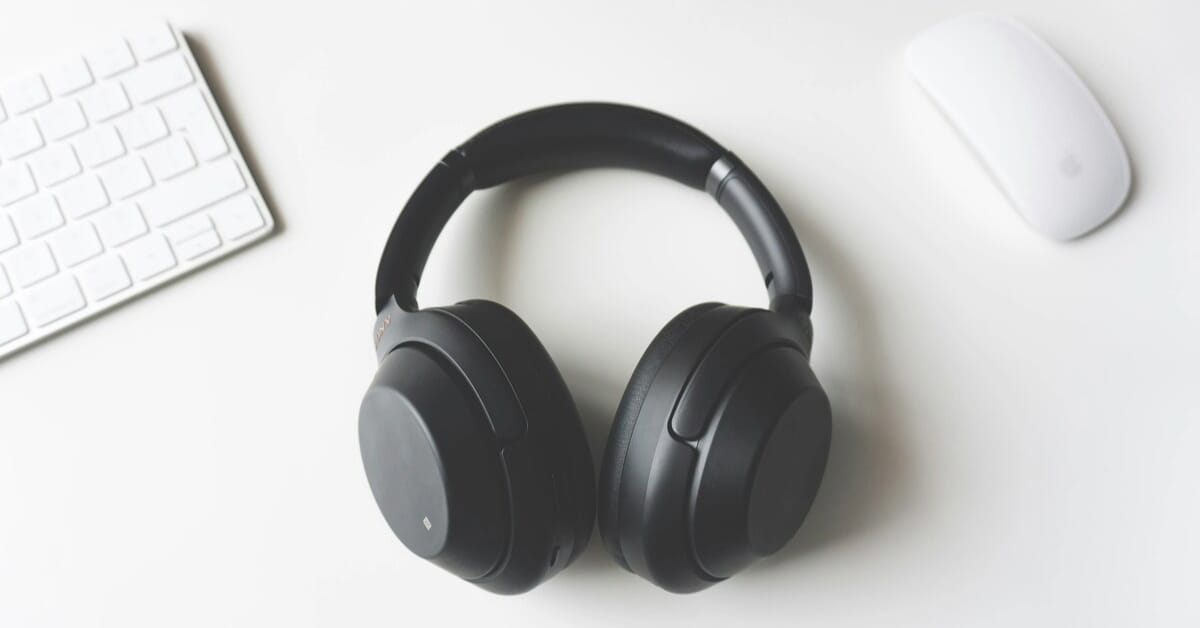Does listening to music help you study? 🎧
Many students swear by the power of music during their study sessions. Whether it’s libraries or coffee shops, you often see headphones all around as people are trying to drown out distractions or set a personal soundtrack to keep their motivation high.
Given this widespread practice, it’s worth looking into whether listening to music really does help you absorb and retain information better, if it simply makes the monotony of studying more bearable, or if it even could have adverse effects on your performance.
Is it good to study with music – according to science?
A Stanford study tested various types of classical music and found that it did help study performance, with peak brain activity being observed in the musical breaks – the transition between the musical movements. A co-author of the study theorized that the process of listening to music could be a way that the brain sharpens its ability to anticipate events and sustain attention. So, while it is not 100% understood, there are indications that music can support you in your study sessions.
How can music help you focus?
Possible positive influences that music may have on you while studying include:
- Music alleviates stress and anxiety
- Music can increase mood, energy, and motivation
- Can improve brain function (as per the Stanford study)
- Music is emotional which may help memory by making you more engaged
- Music can help you focus by blocking out distracting outside noises
- Music fills silence that some people find hard to bear, for example if they are affected by tinnitus
Does classical music help you study better than other genres?
The Stanford study mentioned above and most other studies were done with classical music and did not compare the outcomes to other genres. A common assumption is that music with lyrics is more distracting than instrumental music.
However, in practice, not everyone listens to classical music and many people still say that listening to their favorite modern tunes helps them while studying.
One study compared a large set of Spotify playlists and surprisingly found that the playlists that people use for studying have a lot of overlap with playlists used for sleeping. However, that does not necessarily mean that it is all soft, slow, and instrumental, as one might expect. The playlists they found were very varied.
A takeaway here could be to not let yourself be influenced by one or another study claiming to have found the best study music – experiment for yourself what type of music gets you in your best state of mind for learning. With how different tastes in music are, what works best for you may not work for the next student.
Disadvantages of listening to music while studying
Before you study with music, consider the potential disadvantages that can affect the efficiency and effectiveness of learning. Make sure to look out for those and adjust your study strategy if you notice any of them are affecting you or getting worse with background music. Here are some of the main drawbacks:
You may get distracted
Music, especially those with lyrics or complex melodies, can compete for the cognitive resources that you would need for learning. This can be particularly disruptive during tasks that require significant concentration, like solving complex problems or understanding calculations. The cognitive distraction can also slow you down, reducing your efficiency.
It does not work for everyone
There is no one-size-fits-all approach to learning efficiency. Some may find music immensely helpful, while others find it overwhelmingly distracting. This makes it difficult to establish a general recommendation for studying with music.
You may get overstimulated
The constant additional stimulation of background music can lead to feelings of anxiety or overwhelm in some people. If this is you, especially if you are sensitive to sensory overload, you won’t benefit from any of the positive effects music could have for other’s studying.
It may interfere with your memory
It is theorized that there’s a possibility that the conflicting information your brain receives in parallel from your learning material and the background music can hinder the memory processes involved in learning.
You may get too used to it
If you consistently study with music, there’s a risk that you become so habituated to having background noise that you feel uncomfortable in environments where music is not allowed, for example an exam. It may even make it harder for you to recall your knowledge and perform under a circumstance that is too different from your usual environment.
You can counteract this disadvantage by not using music or noise all the time, and by simulating exam environments as realistically as possible when preparing for tests.
If not music – what type of noise is best for studying?
Another common background noise for studying is different types of generated broadband sound aiming to improve focus while being less distracting than music. Examples are white noise, brown noise, or pink noise (broadband sounds that are perceived as “deeper” than white noise).
Is white noise good for studying?
Through its uniform nature without much variability, white noise has much less potential to be distracting than music. But does white noise help you study in other ways, as well?
Research has suggested that white noise may stimulate the brain regions responsible for dopamine secretion and attention, which may make you more focused on studying. This study found that listening to white noise had a positive effect on vocabulary learning. Another study was inconclusive and suggested there may not be any direct proven effects of white noise on cognitive performance.
How to find what noise helps you focus
Try different styles:
- Compare how you feel with different kinds of noise: white, pink, brown, etc
- Experiment with nature sounds: Many people perceive waves, rain, wind, bird song, or fire crackling as very relaxing and not distracting
- Binaural beats can be an in-between solution between musical pieces and background noise if you’re looking for background ambience specifically designed to evoke certain brainwave states
- Try ambient sound: Ambient sound is the background noise in any environment. By listening to the sounds that remind you of a specific environment, you can evoke that mindset or feeling you associate with that environment. Some students enjoy a library soundscape with shuffling papers and writing sounds for studying, while others work best with the sounds of a busy cafe in the background, or prefer a farm or forest ambience.
Adjust the volume:
Make sure the background noise is loud enough to block out distracting sounds, but not so loud that it becomes distracting. Start at a low volume and adjust as needed.
Monitor how you feel as well as your results:
The best background noise makes you more productive and makes you feel better. Pay attention to which sounds make you feel especially stressed, drained, make you experience scattered thoughts, or suddenly make it easier to get stuff done.
Study aesthetics and lofi study ambience
Lo-fi music combined with playful, peaceful artwork is a notable trend in how people create enjoyable and helpful study experiences for themselves. Lo-fi music is characterized by a calm, soothing atmosphere with various genre influences. The related aesthetic applied to artwork around playlists and online study rooms often is associated with nostalgic or vintage visuals.
In combination, this creates a popular vibe that lots of students perceive as helpful for improving their productivity, as well as a way of identifying with their often stressful academic life in a more positive way. You can find lots of playlists and platforms following this theme to try.

How to find your perfect study background noise: resources
YouTube
Youtube is a go-to resource for study music and playlists, but make sure you find ones without ad breaks. Ads are a sure way to get very distracted frequently, especially since they are often much louder than the rest of the videos’ content.
Spotify
This author tried to find the best study music that aligns with the findings of the Stanford study referred to above. They used cross-fading on Spotify and experimented with various pre-compiled study playlists. Their favorite turned out to be the Solace Album Mix by Monstercat. If you’re using Spotify, we recommend consciously experimenting with different genres and types of playlists to find not only something you enjoy, but what really helps you focus.
Other apps and websites
- Study Music – Memory Booster app: 4.7 stars from 90.1k reviews
- mynoise.net: curated soundscapes that can be interactively combined and generated
- https://lifeat.io/: online study platform with ambience sounds, calming visuals, and integrated study-organizing features
Conclusion
It’s clear that the effectiveness of using music or noises to improve learning varies widely. There is no one-size-fits-all, as is true for most other study hacks and techniques. It stays important that you inform yourself of the options, experiment, and then consistently stick with what you found out works well for you. The earlier on in your studies you find your strategies, the easier your path will be – but it is also never too late to get into new productive habits.




